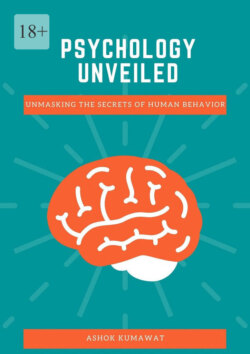Читать книгу Psychology Unveiled: Unmasking the Secrets of Human Behavior - Ashok Kumawat - Страница 4
На сайте Литреса книга снята с продажи.
Chapter 2: The Mind-Body Connection: Exploring the Interface
ОглавлениеIntroduction:
The mind-body connection has long fascinated philosophers, scientists, and psychologists alike. It refers to the intricate relationship between our mental processes, thoughts, emotions, and our physical body. This chapter aims to delve into the depths of this connection, exploring the ways in which our psychological state influences our physical well-being and vice versa. By unraveling the mysteries of the mind-body interface, we can gain valuable insights into the secrets of human behavior.
The Biopsychosocial Model:
To understand the mind-body connection, we must embrace the biopsychosocial model, which emphasizes the integration of biological, psychological, and social factors in shaping human experiences and behavior. This holistic approach recognizes that our physical health, mental state, and social environment are interdependent and mutually influence one another.
Physical Health Impacts Mental Well-being:
Numerous studies have demonstrated the impact of physical health on mental well-being. Physical ailments, chronic diseases, and even minor discomforts can significantly affect our mood, cognition, and emotional state. For example, chronic pain can lead to depression, and hormonal imbalances can contribute to anxiety disorders.
The mechanisms underlying this connection are multifaceted. Physiological changes in the body, such as inflammation, neurotransmitter imbalances, or hormonal fluctuations, can directly affect our brain chemistry and functioning. Moreover, living with physical limitations or chronic illnesses can also lead to psychological distress, impacting self-esteem, body image, and overall quality of life.
Psychological Factors Influence Physical Health:
Conversely, our psychological state can exert a substantial influence on our physical health. Stress, anxiety, and negative emotions can take a toll on our immune system, cardiovascular health, and overall physiological functioning. Chronic stress, for instance, has been linked to increased risk for various health conditions, including heart disease, diabetes, and immune system dysfunction.
The mind-body connection operates through intricate pathways. Stress triggers the release of stress hormones, such as cortisol, which can have long-term detrimental effects on our health. Additionally, negative emotions and psychological distress can disrupt sleep patterns, impair immune function, and increase susceptibility to illness.
Mind-Body Interventions:
Recognizing the mind-body connection has led to the development and widespread use of mind-body interventions as therapeutic approaches. These interventions, such as mindfulness meditation, yoga, and biofeedback, aim to harness the power of the mind to promote physical and psychological well-being.
Mindfulness practices, for example, emphasize present-moment awareness and non-judgmental acceptance of thoughts, emotions, and bodily sensations. Studies have shown that regular mindfulness practice can reduce stress, improve immune function, and enhance overall psychological health.
Similarly, practices like yoga combine physical movement with breath control and meditation, providing a holistic approach to well-being. Yoga has been found to alleviate symptoms of anxiety, depression, and chronic pain, while also improving cardiovascular fitness and flexibility.
The Role of Social Support:
Social connections and support also play a vital role in the mind-body connection. Research has consistently shown that individuals with strong social support networks tend to have better physical and mental health outcomes. Social support acts as a buffer against stress, provides emotional comfort, and encourages healthier lifestyle choices.
Furthermore, the mind-body connection extends to social interactions, as our mental and emotional states influence our interpersonal relationships. For example, positive emotions and empathy can enhance social connections and contribute to a sense of well-being. On the other hand, chronic stress, loneliness, and negative emotions can strain relationships and impact both physical and psychological health.
Conclusion:
The mind-body connection is a powerful and intricate relationship that underscores the interconnectedness of our physical and psychological experiences. Recognizing the impact of our mental state on our physical well-being and vice versa is crucial for understanding human behavior.
By exploring this interface, we can unlock the secrets of human behavior and develop holistic approaches to promote well-being. The integration of biological, psychological, and social factors provides a comprehensive framework for understanding the mind-body connection and developing effective interventions that encompass the entirety of human experience.
